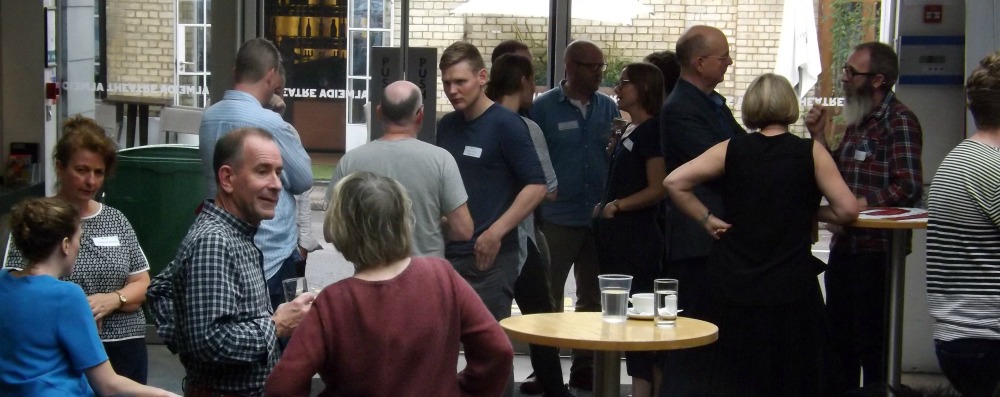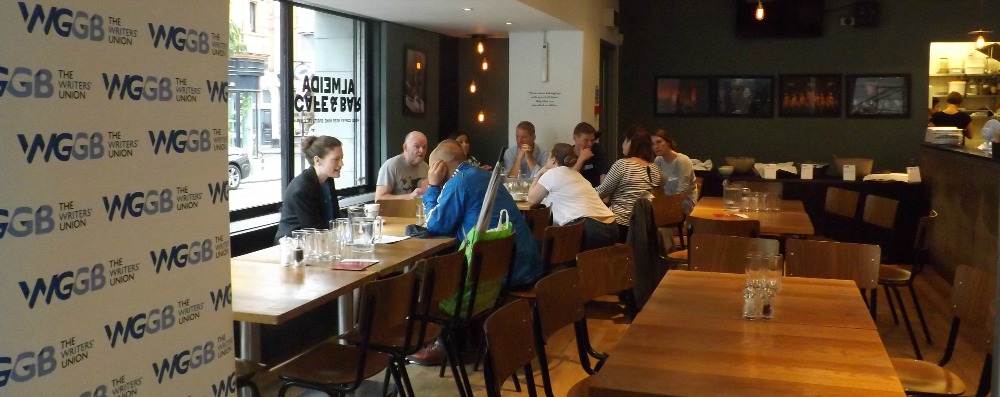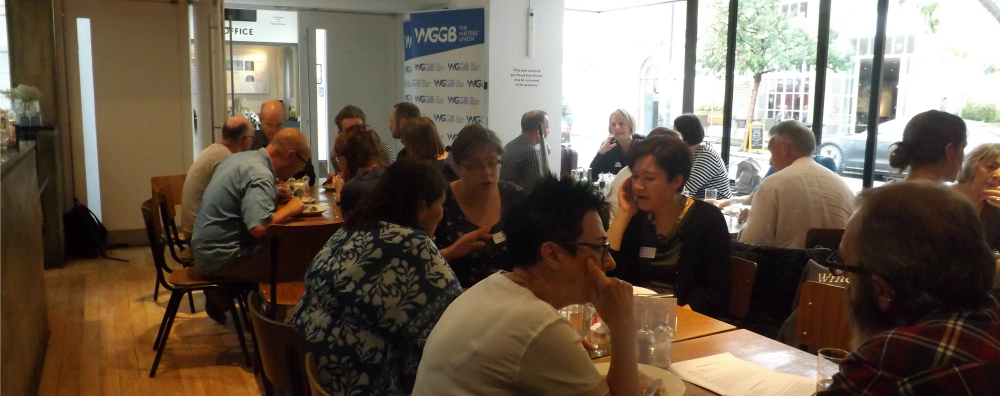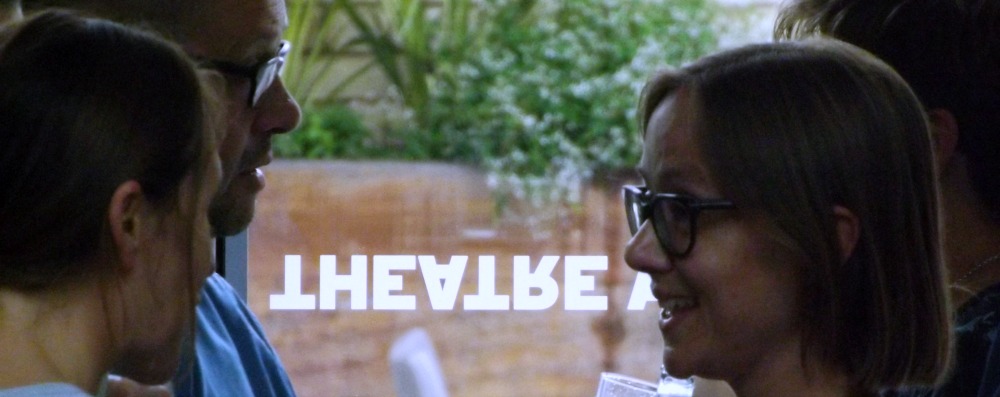That was the question that faced WGGB’s annual forum of theatre literary managers, organised by the WGGB Theatre Committee and held at the Almeida theatre in London on 16 September 2016.
Panellists Suzanne Bell (Royal Exchange), Rob Drummer (Company of Angels), Pooja Ghai (Theatre Royal Stratford East), and Chris Campbell (Royal Court) discussed a number of factors that affected programming, including:
• How do theatres decide what shows to put on?
• Do theatres have policies which exclude as well as include certain types of show?
• How do theatres relate to the wider theatre ecology of their regions, the social and ethnic character of their audiences, and the need to promote diversity on and off stage?
• Are theatres increasingly constrained by austerity?
Introducing the forum, WGGB Theatre Committee Co-Chair David Edgar said he hoped the panel would shed light on “how, in an increasingly changing theatrical universe, those decisions get made.”
Suzanne Bell, New Writing Associate and Dramaturg at Manchester’s Royal Exchange, said that as a subsidised theatre they wanted to “have a dialogue with our audiences and the wider ecology in which we work”, that they thought a lot about how they aspired to place themselves in the national and international landscape, and that they looked for exciting partnerships. Programming wasn’t just about what they put on their stages, but all the different ways they could engage with people – for example working online, or touring in non-theatre spaces.
“The traditional model of producing a play is so far from how we work,” she told the audience, “and only a tiny element of what we do.” She added that in terms of programming policy, they didn’t have one. “Policy can be reductive… we are always looking to question our decisions… we are always looking at how we might take a ‘safe’ piece of programming and do something exciting with it.”
She said they endeavoured to ensure work had a “Manchester flavour” but qualified that by saying that didn’t necessarily mean “it is a local story”. BIRD, a Royal Exchange and Sherman Cymru co-production, for example, was set in Wales but still “resonated with our audience.”
Rob Drummer, recently appointed Artistic Director of Company of Angels, and former Associate Dramaturg at London’s Bush Theatre, spoke about his experience of programming at both. At the Bush, he said, “each year was distinctively different”, and when the theatre moved from its former home above a pub in 2011, to its current space on the Uxbridge Road, it doubled its capacity, meaning that “programming conversations changed overnight”. He said the Bush was open to lots of different ways of making theatre, and that giving writers their first production, and taking risks was its “bread and butter”. In terms of programming policy he said the Bush had one “to a certain extent” – focussing on contemporary work, adaptations and “putting contemporary London on the stage, in all its diversity.”
His move to Company of Angels, which produces challenging theatre for and with young people, means he will be looking at what will appeal to an audience of 15-25 year olds, who are “used to watching The Hunger Games… or sitting on an Xbox”. He added that he was excited by the prospect of “losing some control” and was hopeful about what the future of theatre might look like.
Pooja Ghai, Associate Director of the Theatre Royal Stratford East, which is in the diverse London Borough of Newham, said the theatre had always been “about the community”. She added that that “legacy has always been there” and the theatre is keen to evolve in the right way, particularly as everyone is now doing diverse work. “It’s not a debate anymore.”
She said they were moving away from being culturally specific to being culturally inclusive and that “we are trying to be as wide-reaching as possible… getting people to come into the theatre, show by show.”
A big programming focus at the theatre is on new writing, and on musical theatre – and particularly developing and breaking the form and structure of that medium.
Preserving the “sanctity of the live experience” but at the same time making it relevant to the younger generation to whom ‘screens’ were so important, was also an important consideration. A recent summer college saw young people create, devise and perform scratch nights, while another new venture is an 80-seat studio space for experimental work.
Chris Campbell, Literary Manger of the Royal Court, said their programming policy was simple: “In general we don’t do old plays, adaptations, or plays with historical settings”. He conceded that “this was reductive” but said that was the reason why – “we are in a theatre ecology where lots of that is happening anyway… it’s not what we do.”
He said the theatre’s understanding of diversity was expanding – for example, to encompass age and class. The balance between home grown and international was also important.
While he stressed “we don’t do trends… we just do the best of what’s available” he admitted that in hindsight they often found that they had in fact done trends, and this was where writers played a key role: “Writers sense things coming before the rest of us do.”
The Royal Court’s reputation as the writers’ theatre still stood he said, but “we are more inclined to take seriously work that comes in other ways.”
All panellists agreed that austerity was hitting theatres hard and posing new challenges in programming. “We want to be creatively exciting,” said Suzanne Bell, “But we have to balance books… In our big space [the theatre in the round] we have a tough business model… we are always looking for ways to exploit that model and make it work.”
Pooja Ghai said “we are beginning to feel the cuts quite tangibly”, while Chris Campbell said the Royal Court was “increasingly finding our model inadequate” and that “we always lose money upstairs [at the Jerwood Theatre Upstairs].” He added that while the Royal Court benefited from “private money” (for example from banks and other organisations, which he stressed did not affect programming decisions), and did a lot better in terms of funding than other theatres, “we are not up there with the RSC or National Theatre… it’s likely that if austerity continues we will cut the number of shows.”
Co-production was the subject of much debate. Suzanne Bell said they “can be exciting and allow us to do more than we can do on our own” but that they “very rarely save us money”. Rob Drummer agreed: “Co-production doesn’t make it cheaper or easier… You are doing it for artistic reasons.” Chris Campbell suggested there was “an unexamined area of co-productions” in that they could help “manage expectations” and allow theatres to put on shows that wouldn’t work if they did them on their own.
Literary managers in the audience raised issues such as the precarious financial position of touring plays nationally (as they are dependent on box-office splits), but also the difficulty touring companies faced in building a relationship with audiences, and various “out of the box” thinking that was going on to combat that in terms of innovative scheduling.
Literary managers from Yorkshire and Gloucestershire talked about literary policies which supported writers born, raised or living in their areas, while the success of programming work with a local flavour, or with named actors, was also highlighted.
The challenge of attracting audiences when theatre tickets were more expensive than watching Netflix or going to the local cinema, was discussed, as was ‘London-centricity’ in terms of diversity.
The role of theatre and the arts in both the Scottish referendum and Brexit was raised, as was the disparity between what the creative community thought and how people ultimately voted. The day was perhaps best summed up by Rob Drummer who outlined the challenges this threw up for theatres and the complex job they now faced in “finding out what half the country thinks”.
Ultimately, he said, this was a “wonderfully problematic position to be in as a programmer.”
All photos: Sarah Woodley






